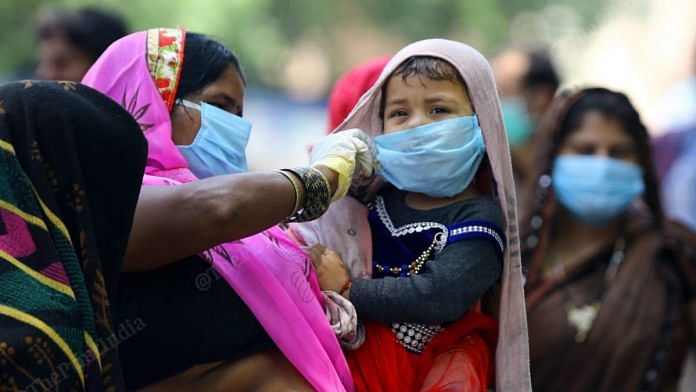New Delhi: Scientists all over the world are working on better understanding the SARS-CoV-2 virus to arrive at more effective treatment protocols.
Here’s a round up of some of the latest scientific findings on Covid-19 from across the world.
Some languages could increase Covid risk
Speaking in languages that use more aspirated consonants — which are pronounced by a forceful expulsion of air — may lead to increased spread of Covid-19, according to researchers from the RUDN University in Russia.
The virus primarily spreads through droplets of liquid from the respiratory passages of an infected person. The disease spreads faster through coughing or sneezing. However, a regular conversation can also lead to infection, and the amount of droplets produced depends on the sounds pronounced by an infected speaker.
In a paper published in the journal Medical Hypothesis, researchers suggest that sounds that add the most to the spread of Covid-19 and other viruses, may include aspirated consonants, such as ‘p’, ‘t’, and ‘k’ in the English language.
Research on past virus outbreaks has also suggested a correlation between the spread of infections and the language spoken by an infected people.
In 2003, after the outbreak of SARS-CoV-1 in South China, over 8,000 cases were registered in 26 countries. The US accounted for 70 of them, but Japan did not have a single patient, despite the fact that the number of Japanese tourists in China at the time was much higher than US travellers.
Some scientists suggested that this was because the staff of Chinese stores spoke to US tourists in English, and to Japanese guests in Japanese.
Researchers from RUDN University found a similar correlation for Covid-19. However, they say it is difficult to experimentally prove this hypotheses.
Also read: 87% adults in India say they will take Covid-19 vaccine when available — WEF survey
Rapid test that can help diagnose Covid with a smartphone in 30 minutes
US scientists have created a rapid Covid-19 molecular test with a portable instrument that gives results in 30 minutes and can be used with a smartphone. This test could allow the infection to be diagnosed without a lab.
The test can also allow screening for Covid-19 at public events, auditoriums, and large gatherings, the researchers said.
Currently, the tests for SARS-CoV-2 requires a lab technician to take a sample from nasal and throat swabs, put that swab into a solution and send it to a lab for a multistep process of extracting, isolating and multiplying the RNA inside the virus.
This RNA multiplication process, called RT-PCR, requires specialised equipment and trained personnel.
The new device, described in the journal Proceedings of the National Academy of Sciences, uses a simpler process called loop-mediated isothermal amplification (LAMP), which bypasses the RNA extraction and purification steps.
Asthma patients not at increased risk of severe Covid-19
Scientists have now confirmed that people with asthma are not at an increased risk of developing severe complications from Covid-19, contrary to what was initially believed.
For a study published in the Annals of the American Thoracic Society, researchers looked at data from peer-reviewed studies, and compared the prevalence of asthma among patients hospitalised for Covid-19 with the prevalence of asthma in the corresponding population.
They also analysed the medical records of 436 hospitalised Covid-19 patients to evaluate the likelihood that patients with asthma would be intubated more often than patients without asthma.
The researchers found that the proportion of asthmatics among hospitalised patients with Covid-19 was relatively similar to the asthma prevalence in each study site’s population.
Also read: Cancers spread, heart conditions worsen — halt on elective surgeries taking its toll
Anonymised cell phone data can help predict Covid-19 spread
Researchers show that changes in cell phone activity in workplaces, transit stations, retail locations, and at places of residence can predict potential spike in Covid-19 in an area.
The study, published in JAMA Internal Medicine, suggests that cell phone location data can help public health officials identify and monitor areas at greatest risk of rapid spread of Covid-19.
For the study, the team looked at anonymous cell phone location data, publicly available via Google, and incidence of Covid-19 for more than 2,500 US counties between January and May 2020.
They found that changes in cell phone activity in workplaces, transit stations, retail locations, and at places of residence were associated with Covid-19 incidence.
New scoring system to aid Covid-19 diagnosis
Egyptians scientists have developed a new scoring system to help doctors classify suspected Covid-19 patients in order to determine who would require a follow-up, home isolation, quarantine or further investigations.
The proposed scoring system, takes into account the evidence of exposure, symptoms and and other clinical data, if available.
The score can be calculated in a few minutes. According to researchers, collecting nasal and swab specimens from all suspected patients can be costly, given the extent of the spread of the disease. Instead the scoring system can help prioritise who should be tested.
Also read: Obese & overweight patients at high risk of severe Covid illness, finds French study



